Taussig,
Frank W.
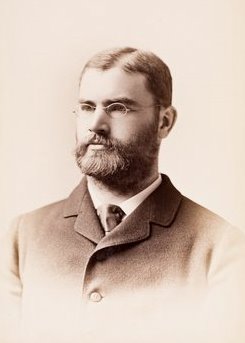
ENLARGE
|
Frank W. Taussig (1859 - 1940) was a U.S. economist and educator,
born in St. Louis. He graduated from Harvard in 1879, where
remained to become professor of economics in 1892. He served as
editor of the Quarterly Journal of Economics from 1889 to
1890 and from 1896 to 1935. He was elected president of the
American Economic Association in 1904 and 1905.
A tax imposed on a dwelling tends to be borne by the occupier.
If the owner is also the occupier, the situation is simple enough;
the burden clearly must be borne by him. But if, as is commonly
the case, the dwelling is let and is built with the expectation of
letting, the burden is likely to be shifted to the occupier
(tenant) in the shape of higher rent. the building will not be put
up unless the owner has reason to believe that the rents will
yield him the current return on investment, and will yield that
return net; that is, after payment of all expenses. Taxes are
reckoned by him among th expenses. ...A remission of taxes would
not necessarily lower rents at once; this consequence would ensue
only after the greater return to the owners had stimulated an
increase in the supply of houses.
[From: Principles of Economics
(New York: The Macmillan Company, 1912), p.518.]
|
Thomas,
Norman
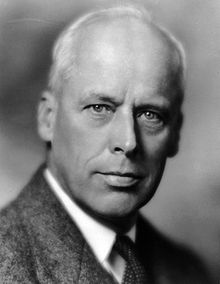
ENLARGE
|
Henry George stands high in any list of Americans who have
greatly served the world. No man ever wrote on economic matters
with a greater passion for humanity or with more genuine
eloquence. I am a Socialist and not a single taxer, but Henry
George's position that the rental value of land belongs to society
is incontroversial, and his method of a land value tax is, at
least in urban areas, the best way I know to assert the principle
that land is a social resource.
[Source of this quote not identified]
|
Thoreau,
Henry David

ENLARGE
|
At present n this vicinity the best part of the land is not
private property; the landscape is not owned. But possibly the day
will come when ... fences shall be multiplied and man-traps and
other engines invented to confine men to the public road, and
walking over the surface of God's earth shall be construed to mean
trespassing on some gentleman's grounds.
[From: "Essay on Walking,"
in Excursons (1862), p. 264]
|
Thrall,
Grant Ian
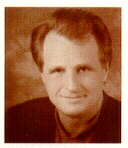
ENLARGE

ENLARGE
|
Professor Grant Thrall has been on the faculty of McMaster
University in Canada, and the State University of New York at
Buffalo. In 1989, he was Resident Scholar of the Homer Hoyt
Institute in Washington DC. In 1990, he was Visiting Distinguished
Professor at San Diego State University. Since 1983, he has been
Professor of Geography at University of Florida.
The following excerpt from Land Use and Urban Forms: The
Consumption Theory of Land Rent (1987, p.149) points to the
deficiency in data to support the dynamic impact on communities
that Henry George forecasted would occur as property improvments
(including residential buildings) are exempted from annual
taxation and the proportion of location rent collected via
taxation increases. This passage is included here as an important
theoretical issue to resond to for proponents of the public
collection of rent. Thrall wrote:
... the property tax would return to the community exactly the
value that land received because of the community. This was
demonstrated in the above Consumption Theory of Land Rent analysis
to be a special case of the open city (one whose residents are
willing and able to move in and out). It is not, then, surprising
that empirical evidence has failed to confirm the Henry George
theorem; empiricists should look for support in those cities that
conform most closely to being open.
|
Tobin,
James

ENLARGE
|
I think in principle it's a good idea to tax unimproved land,
and particularly capital gains (windfalls) on it. Theory says we
should try to tax items with zero or low elasticity, and those
include sites.
[source not identified]
|
Tocqueville,
Alexis de
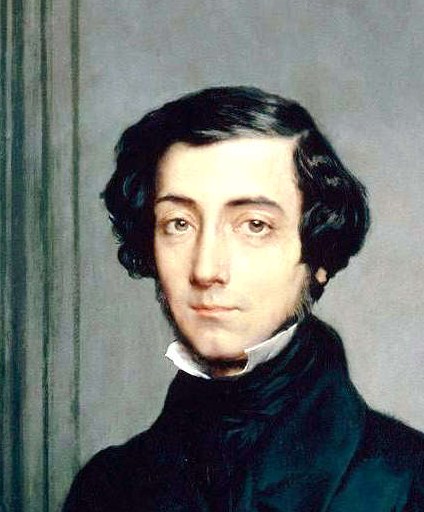
ENLARGE
|
The American man of the people has conceived a high idea of
political rights because he has some; he does not attack those of
others, in order that his own may not be violated. Whereas the
corresponding man in Europe would be prejudiced against all
authority, even the highest, the American uncomplainingly obeys
the lowest of his officials.
[From: "The Advantages of
Democratic Government," Democracy in America (1848),
Harper & Row edition, 1966, Vol.I, Chap.6, p.238]
|
Tocqueville,
Alexis de |
Democratic government makes the idea of political rights
penetrate right down to the least of citizens, just as the
division of property puts the general idea of property rights
within reach of all. That, in my view, is one of its greatest
merits.
[From: "The Advantages of
Democratic Government," Democracy in America (1848),
Harper & Row edition, 1966, Vol.I, Chap.6, p.239]
|
Tocqueville,
Alexis de |
In aristocracies rents are not paid in money only, but also by
respect, attachment, and service. In democracies money only is
paid.
[From: "Rents Raised and Terms
of Leases Shortened," Democracy in America (1848),
Harper & Row edition, 1966, Vol.II, Chap.6, p.580]
|
Tocqueville,
Alexis de |
Any revolution is more or less a threat to property. Most
inhabitants of a democracy have property. And not only have they
got property, but they live in the conditions in which men attach
most value to property.
[From: "Why Great Revolutions
Will Become Rare," Democracy in America (1848),
Harper & Row edition, 1966, Vol.II, Chap.21, p.636]
|
Tocqueville,
Alexis de |
In no other country in the world is the love of property
keener or more alert than in the United States, and nowhere else
does the majority display less inclination toward doctrines which
in any way threaten the way property is owned.
[From: "Why Great Revolutions
Will Become Rare," Democracy in America (1848),
Harper & Row edition, 1966, Vol.II, Chap.21, pp.638-639]
|
Todd,
Ralph H.
|
[Ralph H. Todd is Director, Center for Applied Urban Research,
University of Nebraska, Omaha]
Obviously, heavy taxes on the location will not discourage or
inhibit improvements; on the contrary, heavy taxes on locations
should put effective pressure on the owners to put their sites to
better use. A heavier tax on unimproved land would allow a city to
expand in an orderly manner without relying on growth policies and
huge subsidies, by simply allowing the profit moive and the free
enterprise market system to function more effectively.
[Source of this quote not identified]
|
Tolstoy,
Leo
(1828-1910)

ENLARGE
|
Tolstoy attempted, unsuccessfully, to convince Czar Nicholas II
to introduce reforms that incorporated the proposals of Henry
George. Of Henry George, he wrote:
People do not argue with the teachings of [Henry] George, they
simply do not know it. And it is impossible to do otherwise with
his teaching, for he who becomes acquainted with it cannot but
agree. ...Solving the land question means the solving of all
social questions. ...Possession of land by people who do not use
it is immoral -- just like the possession of slaves.
Solving the land question means the solving of all social
questions. ...Possession of land by people who do not use it is
immoral -- just like the possession of slaves.
[Source not identified]
|
Tolstoy,
Leo
(1828-1910)
|
"Certain persons have driven a herd of cows, on whose
milk they live, into an enclosure. The cows have eaten and
trampled the forage, they have chewed each others' tails, and they
low and moan, seeking to get out. But the very men who live on the
milk of these cows have set around the enclosure plantations of
mint, they have cultivated flowers, laid out a race-course, a
park, and a lawn-tennis ground, and they do not let out the cows
lest they should spoil these arrangements. …The cows get
thin. Then the men think that the cows may cease to yield milk,
and they invent various means for improving the condition of the
cows. They build sheds over them, they gild their horns, they
alter the hour of milking, they concern themselves with the
treatment of old and invalid cows … but they will not do the
one thing needful, is to remove the barrier and let the cows have
access to-S pasture."
[Leo Tolstoy, A Great Iniquity]
|
Tolstoy,
Leo
(1828-1910)
|
"The only indubitable means of improving the position of
the workers, which is at the same time in conformity with the will
of God, consists in the liberation of the land from its usurpation
by the landlords. …The most just and practicable scheme, in
my opinion, is that of Henry George, known as the single-tax
system."
[Leo Tolstoy, To the Working
People, xiii]
|
Tolstoy,
Leo
(1828-1910)
|
"The injustice of the seizure of the land as property has
long ago been recognised by thinking people, but only since the
teaching of Henry George has it become clear by what means this
injustice can be abolished."
[Leo Tolstoy, Letter to Single-Tax
Leagues of Australia]
|
Tolstoy,
Leo
(1828-1910)
|
"It is Henry George's merit that he not only exploded all
the sophism whereby religion and science justify landed property
and pressed the question to the farthest proof, which forced all
those who had not stopped their ears to acknowledge the
unlawfulness of ownerships in land, but also that he was the first
to indicate a possibility of solution for the question. He was the
first to give a simple, straightforward answer to the usual
excuses made by the enemies of all progress, who affirm that the
demands of progress are illusions, impracticable, inapplicable.
The method of Henry George destroys these excuses by so putting
the question that by to-morrow committees might be appointed to
examine and deliberate on his scheme and its transformation into
law."
[Leo Tolstoy, Letter to a German
Reformer]
|
Tolstoy,
Leo
(1828-1910)
|
"The land is common to all. All have the same right to
it; but there is good land and bad land, and everyone would like
to take the good land. How is one to get it justly divided? In
this way: he who will use the good land must pay those who have
got no land of the value of the land he uses," Nekhludoff
went on, answering his own question. ..."Well," he had a
head, this George," siad the oven builder, moving his brows. "he
who has good land must pay more."
[Leo Tolstoy, Resurrection,
Book II., Chap. 9]
|
Tolstoy,
Leo
|
If the new Czar were to ask me what I should advise him to do,
I would say to him: Use your autocratic power to abolish landed
property in Russia, and to introduce the single-tax system, and
then give up your power and give the people a liberal
constitution.
[From: Progressive Review,
August, 1897, p. 419, note]
|
Turgot,
Anne Robert Jacques

ENLARGE
|
The labor of the tiller of the soil gives the first impulse.
That which his work makes the land produce beyond his personal
needs is the sole fund for the wages which all the other members
of society receive in exchange for their work.
[From: On the Formation and
Distribution of Wealth (1766), Sec. 5]
|
Turgot,
Anne Robert Jacques
|
Land is always the first and only source of all wealth.
[From: On the Formation and
Distribution of Wealth (1766), Sec. 55]
|
URBAN LAND INSTITUTE |
In the redevelopment situation the site value tax system acts
to increase the supply of sites for redevelopment. ...The site
value tax system thus operates to accelerate the transition of
marginal properties to the status of economic redevelopment sites.
...Probably the most important effects of a site value tax system
is the pressure on owners to sell their property for redevelopment
if they cannot or will not redevelop it themselves.
[from: Research Report No. 19]
|
Urbanski,
Adam

ENLARGE
|
The materials about the two-rate real estate tax that you left
for me are quite instructive and persuasive. It makes good sense
to pursue the changes you advocate and I would be glad to lend my
support to the effort.
[President, Rochester Teachers Association, from a letter to
Marvin Morris, July 10, 1991]
|
Vauban,
Marshall
|
Marshall Vauban published in 1707 his Projet d'une Dixme
Royale. His travels through France had given him an
opportunity to see the poverty of the peasants, which he believed
was due largely to heavy and unequal taxation. He proposed a
reform of France's tax system in the form of a dixme royle,
or royal tithe. This was a comprehensive proposal for simiplifying
the existing tax system calling for proportional taxes on the
produce of land and on the revenue of wealth in general.
|
Vaughn,
Herbert
(Cardinal)
|
Cardinal Herbert Vaughn, who was the spiritual leader of the Mill
Hill Order of England, arrived in the United States in 1871. By
the latter part of 1888, Cardinal Vaughn formed St. Joseph
Seminary in Baltimore.
Without ties to bind the people to the land, they have been
driven, especially of late years, in ever increasing multitudes to
the towns. Here they have herded apart from the better classes,
forming an atmosphere and a society marked on the one hand by an
absence of all the elevating influences of wealth, education and
refinement, and on the other by the depressing presence of almost
a dead level of poverty, ignorance and squalor. they are not
owners either of the scraps of land on which they live or of the
tenements which cover them; but they are rackrented by the agents
of absentee landlords, who know less of them than Dives knew of
Lazarus.
[From: An Inagural Address to the
Annual Conference of the Catholic Truth Society, Stockport;
published in the St. Vincent de Paul Quarterly, New York,
November, 1899; p. 286]
|
Vickrey,
William

ENLARGE
|
William Vickrey, in 1993 a Professor-Emeritus, Columbia
University and President of the American Economic Assocation, made
the following remarks at the Henry George School in New York:
Economists are almost unanimous in conceding that the land tax
has no adverse side effects. ...Landowners ought to look at both
sides of the coin. Applying a tax to land values also means
removing other taxes. This would so improve the efficiency of a
city that land values would go up more than the increase in taxes
on land.
Landlords ought to be in favor of this proposal. If taxes on
structures were removed, land values in New York City would go up
much more.
There is also a strong equity argument in its favor. Consider the
example of a tennis court. Even though people playing tennis have
no use for electric, water and communication facilities, these
services must be provided anyway. ...In effect we have to pay for
utilities twice: once to the provider and once to the landowners
who benefit by them.
|
Villard,
Oswald Garrison

ENLARGE
|
Oswald Garrison Villard, publisher of The Nation in the
early twentieth century, wrote:
Few men made more stirring and valuable contributions to the
economic life of modern America than did Henry George. What he has
written about protection and free trade is as fresh and as
valuable today as it was at the hour in which it was penned.
|
Voltaire
(Francois-Marie Arout de Voltaire)

ENLARGE
|
In the Age of Enlightenment, Voltaire gave the following
words to one of his characters, Candide:
The fruits of the earth are a common heritage of all, to which
each man has equal right.
|
Voltaire
(Francois-Marie Arout de Voltaire) |
Each individual owns that part of the national territory and
revenue which the laws secure to him, and no possession or
enjoyment can at any time be withdrawn from the operation of the
law.
[From: Dictionnaire Philosophique,
tit. Droit Cononique, Sec. 2, Oeuvres, Vol. LIV.,
p. 138]
|
Voskuil,
W.H.
|
In 1930, he held the position of Assistant Professor of Industry
and the University of Pennsylvania, Philadelphia, Pennsylvania.
Land is valued because of its productive power, ... widely
defined to include its usefulness for dwellings, offices, and
factory sites, crops, forests, and mineral products. Differences
in land values arise out of differing degrees of productive power
for each or any of the above purposes..
[From: "The Indestructible
Properties of Land," The Annals of the American Academy
of Political and Social Science, Vol. CXLVIII, No. 237, March,
1930, p.50]
|
Voskuil,
W.H.
|
The productivity of urban lands consists of benefits derived
from the use of such land for residential purposes, office
buildings, factory sites, terminal facilities, and so forth. The
properties of the land which give it value are standing-room and
situs. By situs is meant the location of a plot of land with
reference to those activities of man in its vicinity which of its
use for profit-taking purposes.
[From: "The Indestructible
Properties of Land," The Annals of the American Academy
of Political and Social Science, Vol. CXLVIII, No. 237, March,
1930, p.54]
|
Walker,
Francis A.
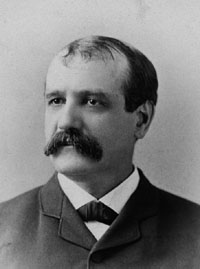
ENLARGE
|
First President of the American Economic Association:
A highway man points a pistol at my head, but offers to spare
me if I shall give him $500, which I proceed to do with the
greatest alacrity. In sparing my life he renders me the greatest
possible service. ...Still the question will arise, "How came
the highway man to be in a position to do me such a vital service,
and, after all, what right has he to what way my $500?" In
like manner, while the owner of land ... undoubtedly does me a
great service [the use of the land] ... it will still be rational
and pertinent for me to inquire, at least under my breath, what
business he has with the land, more than I or any one else.
|
Walker,
Francis A.
|
The unqualified ownership of land thus established (viz., "in
a way which in this age would be regarded as monstrous and corrupt"),
enables the land-owning class to reap a wholly unearned benefit at
the expense of the general community.
[From: Political Economy,
Part VI, Chap.7, Sec. 418]
|
Wall Street Journal editors |
In an article appearing March 5, 1987, the Wall Street Journal
published this:
As explained in the greatest economics treatise ever written
by an American -- Henry George's "Progress and Poverty"
(1879) -- money diverted to pay for the use of natural resources
is like a dead weight or tax on the productive factors in the
economy, capital and labor.
|
Wallace,
Alfred Russel
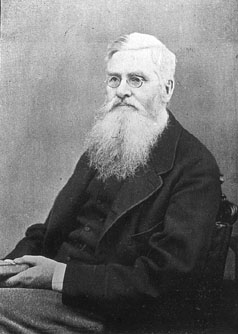
ENLARGE
|
Unrestricted private property in land is inherently wrong, and
leads to serious and wide-spread evils.
[From: Land Nationalization,
Chap. VIII, p. 229]
|
Wallace,
Alfred Russel
|
Unrestricted private property in land gives to individuals a
large proportion of the wealth created by the community at large.
[From: Land Nationalization,
Chap. VIII, p. 231-2]
|
Wallace,
Alfred Russel
|
We permit absolute possession of the soil of our country, with
no legal rights of existence on the soil to a vast majority who do
not possess it.
[From: Malay Archipelago
(1969), Vol. II, p. 464]
|
Wedgwood,
Josiah

ENLARGE
|
"It was in 1904 when Henry George and Progress and Poverty
wre both enjoying a great popularity that Josiah Wedgwood fell in
love with both to remain a stout and incendiary Georgist to the
end of his life. Nearly forty years later he wrote a matchless
tribute to his leader, the greatest single influence inhis life:
"From those magnificent periods, unsurpassed in the whole
of British literature, I acquired the gift of tongues. Ever since
1905, I have known there was a man from God and his name was Henry
George. I had no need henceforth for any other faith."
|
Whelan,
James

ENLARGE
|
James Whelen, mayor of Atlantic City, New Jersey, wrote in N.J.
Municipalities, January 1998, p.18:
Let us tax land, not improvements. While the notion that
owners of vacant land would pay the same tax as owners of a fully
developed office complex next door may seem strange at first, it
would be a great anti-speculation tool that would encourage
development.
|
Whitlock,
Brand
(1869-1934)

ENLARGE
|
Brand Whitlock was born in Urbana, Ohio, in 1869. He became a
journalist and worked for the Chicago Herald. He was later
employed by John P. Altgeld, the reforming governor of Illinois.
Whitlock also worked closely with Samuel Jones, the radical mayor
of Toledo.
br> Whitlock became increasingly involved in politics and
eventually served four terms as mayor of Toledo (1906-14). Like
Samuel Jones, Whitlock developed a reputation as an honest and
efficient mayor. He served as United States ambassador to Belgium
during the First World War.
Whitlock expressed his frustration with the inability of so many
so-called public servants to rise above the vested interests who
used personal and corporate wealth to see to that the status quo
-- and their deep-rooted privileges, remained in place:
Henry George's proposition, the Single Tax, will wait, I
fancy, for years, since it is so fundamental and mankind never
attacks fundamental problems until it has exhausted all the
superficial ones.
[source not provided]
|
Whitman,
Walt
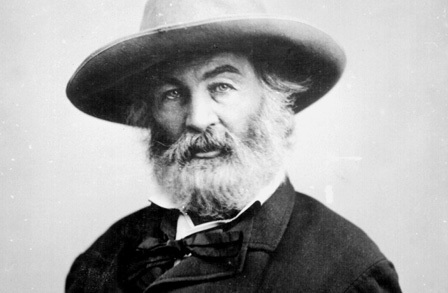
ENLARGE
|
Many sweating, ploughing, threshing, and then the chaff for
payment receiving,
A few idly owning, and they the wheat continually claiming.
[From: "Song of Myself," in
Leaves of Grass, p. 68]
|
Willis,
Nathaniel Parker
(1806-1867)
|
Nathaniel Parker was born in Portland, Maine the eldest son of a
newspaper proprietor in Boston. After attending Boston grammar
school and Phillips Academy at Andover, he entered Yale College in
October 1823. In 1829 he started the American Monthly Magazine,
which was continued from April of that year to August 1831, but
failed to achieve success. On its discontinuance he went to Europe
as foreign editor and correspondent of the New York Mirror.
To this journal he contributed a series of letters, which, under
the title Pencillings by the Way,/i>, were published at
London in 1835.
How can you buy the right to exclude at will every other
creature made in God's image from sitting by this brook, treading
on this carpet of flowers, or lying listening to the birds in the
shade of these glorious trees -- how can I sell it to you? is a
mystery not understood by the Indian, and dark, I must say, to me.
[From: Voices of the True-Hearted
(1846), Philadelphia, p. 98]
|
Wilson,
Woodrow
(1856-1924)
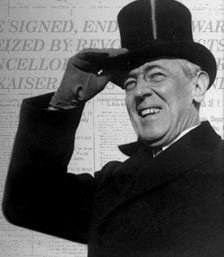
ENLARGE
|
All this country needs is new and sincere body of thought in
politics, coherently, distinctly and boldly uttered by men who are
sure of their ground. The power of men like Henry George seems to
me to mean that; and why should not men who have sane purposes
avail themselves of this thirst and enthusiasm for better, higher,
more hopeful purpose in politics than either of the present,
moribund parties can give?
(Quoted from "Life and Letters of
Woodrow Wilson" by Raoy Stanndard Baker, Doubleday, Page &
Co.)
|
Winstanley,
Gerrard (Jerrard)

ENLARGE
|
Winstanley was the primary leader of the 17th century English
agrarian reformers, the Diggers. In 1649, he wrote:
The Earth (which was made to be a Common Treasure of relief
for all) has been hedged in to Enclosures by the teachers and
rulers, and others have been made Servants and Slaves: And that
Earth that is within this Creation, made a Common Storehouse for
all, is bought and sold, and kept in the hands of a few. ...Though
a man be brought up in the land, yet he must not work for himself
but for him that bought the Land; He that has no Land must work
for small wages for those who call the Land theirs.
|
Winstanley,
Gerrard |
Here, O thou Righteous Spirit of the whole creation, and judge
who is the thief, he who takes away the freedom of the common
earth from me, which is my creation-rights; ...or I, who take the
common earth to plant upon for my free livelihood, endeavoring to
live as a free commoner in a free commonwealth, in righteousness
and peace.
And is not this slavery, say the people, that though there be
land enough in England to maintain ten times as many people as are
in it; yet some must beg of their brethren, or work in hard
drudgery for day wages for them, or starve, or steal, and so be
hanged out of the way, as men not fit to live on the earth?
[From: The Law of Freedom in a
Platform or True Magistracy Restored (1652)]
|
Winstanley,
Gerrard |
We demand, yea or no, whether the earth with her fruits, was
made to be bought and sold from one to another? And whether one
part of mankind was made lord of the land, and another part a
servant by the Law of Creation before the Fall.
[From: a Letter to Lord Fairfax (1649),
cited in the New Age, 24 February, 1898, p.333]
|
Wood,
Robert
(1924 - 2005)

ENLARGE
|
Robert Wood, was Professor of Government at Wesleyan University,
who also taught political science at M.I.T., after which he served
as Secretary of the U.S. Department of Housing and Urban
Development, under President Lyndon Johnson, wrote in Domestic
Affairs, May 1991:
What has pushed the price of housing out of reach for many
Americans is the spiraling cost of land. Over the past thirty
years, land values have increased three times faster than the
consumer price index; they now exceed one-quarter of the total
cost of the typical housing unit.
Our persistent practice of taxing real estate development more
than undeveloped or underdeveloped land nad our failure to
recapture the costs of new roads and community facilities that
open up vacant land for development have been major impediments to
the provision of affordable housing. In short, what urban America
needs most is a land reform program.
|
WORLD BANK |
A more effective system of agricultural land taxation would
offer one means of obtaining a reasonable contribution from the
richer members of the rural community without destroying
incentives related to agricultural output.
In designing a system of land taxation, the Government should
focus not only on raising revenues, but also on nonfiscal
developmental objectives, such as distributing income better in
the rural areas, using agricultural land more effectively.
|
Wright,
Frank Lloyd
(1869-1959)

ENLARGE
|
Wright, one of the most heralded architects in United
States history, wrote in The Living City (c. 1958, p.162):
Henry George showed us ... the only organic solution of the
land problem ...
|
Wright,
Frank Lloyd
|
Frank Lloyd Wright delivered an address to the Henry George
School Commerce and Industry luncheon on 4October, 1951, in
Chicago. In that address, he said:
"Democracy can be only one thing: a thing that would
enable a man like Henry George to hae had some effect in his day.
Democracy is, inevitably -- the gospel of individuality. It is the
supreme encouragement and protection of the individual as such,
first of all... Men like Henry George knew what it meant and
fought for a basis for it. It's the highest and finest ideal on
earth today or in the mind of man because it is predicated on the
basis of freedom."
|
Yat-sen,
Sun

ENLARGE
|
The teaching of Henry George will be the basis of our program
of reform. ...The (land tax) as the only means of supporting the
government is an infinitely just, reasonable and equitably
distributed tax, and on it we will found our new system. The
centuries of heavy and irregular taxation for the benefit of the
Manchus have shown china the injustice of any other system of
taxation.
[source not identified]
|
Yat-Sen,
Sun |
Sun Yat-Sen realized that solving the many problems of the
Chinese people was intimately linked to the land question.
In the Principle of the Peoples' Livelihood, published in
1924, he wrote:
When modern, enlightened cities levy land taxes, the burdens
upon the common people are lightened, and many other advantages
follow. If Canton city should now collect land taxes according to
land values, the government would have a large and steady source
of funds for administration. The whole place could be put into
good order
But at present, the rising land values in Canton all go to the
landowners themselves -- they do not belong to the community. The
government has no regular income, and so to meet expenses it has
to levy all sorts of miscellaneous taxes upon the common people.
This burden upon the common people is too heavy; they are always
having to pay out taxes and so are terribly poor -- and the number
of poor people in China is enormous. The reasons for the heavy
burdens upon the poor are the unjust system of taxation practiced
by the government, and the unequal distribution of land power and
the failure to solve the land problem. If we can put the land tax
completely into effect, the land problem will be solved and the
common people will not have to endure such suffering.
|
Yinger,
John

ENLARGE
|
Professor Yinger of the Maxwell School of Citizenship and Public
Affairs, Syracuse University has provided his students with
extensive class notes on land markets.
|
Zacharia,
Karl E.
(Professor)
|
Zacharia was a professor at Heidelberg University, writing on the
nature of ancient law. Other biographical information has not been
found.
Nature has not herself divided the good things of the earth
between individual men, and this is the source of all wrangling
and quarreling among them.
[From: Vierzig Bucher vom Staate
(1841), Book XXI, Part I, Divison 1, Sec. 2, p. 146]
|
Zola,
Emile
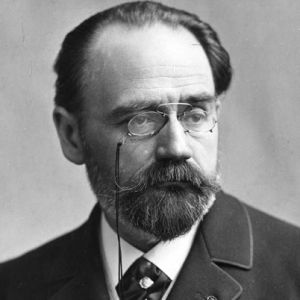
ENLARGE
|
As, I see it clearly before my eyes, the city of justice and
happiness! ...No more idlers of any kind, and hence no more
landlords supported by rent, no more men of fortune kept like
mistresses by fortune -- in short, no more luxury and no more
misery! Ah, is not this the ideal of equity, the supreme wisdom,
no privileged classes, and none doomed to wretchedness; everyone
creating his welfare by his own effort, the average of human
welfare!
[From: L'Argent, Chap. XII, pp.
438-9 (Last words of Sigismond)]
|
Zuckerman,
Mortimer B.
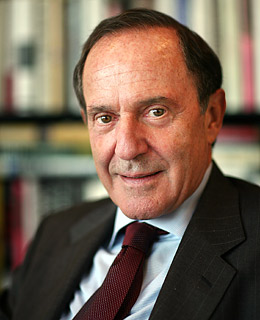
ENLARGE
|
Henry George, the great 19th-century economist, put it best: "Protective
tariffs are as much applications of force as are bockading
squadrons, and their objective is the same -- to prevent trade.
The difference between the two is that blockading squadrons are a
means whereby nations seek to prevent their enemies from trading;
protective tariffs are a means whereby nations attempt to prevent
their own people from trading. What protection teaches us, is to
do to ourselves in time of peace what enemies seek to do to us in
time of war.
[From an editorial, "That Other
Deficit," in U.S. News & World Report, 23 December
1985]
|
BROWSE BY AUTHOR
|























 THRU
THRU 